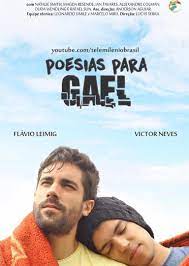
POESIAS PARA GAEL
Brazil, 2017, 106 minutes, Colour.
Flavio Leimig, Victor Neves, Natalie Smith.
Directed by Victor Neves.
This film was written and directed by Viktor Never who plays the central role of the title, Gael.
This is a film principally for a gay male audience. And, it combines various gay themes, dramatised very emotionally. In fact, this is a very emotional film, could even be called sentimental at times, not a film for audiences who want or moral a more rational style of filmmaking and theme exploration.
At the centre are three friends from school days. Eline, Natalie Smith, has had a crush on Gabriel but has been ignored by him. Angry, she asks the other friend, Hugo, to find out whether Gail is gay. More emotional complications, especially the relationship between Hugo and Aileen, her resentments, mixing with other men, her becoming pregnant.
In the meantime, Hugo discovers his feelings for Gail. Which means that the first part of the film highlights self-discovery, love and affection, sexual attraction, a crisis with the pregnant and lean, Gael and a possible illness, the initial wariness of Gail’s mother.
The bonding between the two men is very strong. However, Hugo has to go to visit his family in another city, is approached by a manipulative former girlfriend who sends compromising photos and answers the phone to go. Hugo has to make every effort to reconnect with KL who is consoled by his mother and a visit from an aggressively sexual cousin.
The next stage of the film is reconciliation, using the title of the film, Gael having been a published poet, but Hugo writing columns for reconciliation. The next’s marriage, the preparations, the enthusiasm of the mother-in-law, the hesitation of Hugo’s mother, Aileen and the reconciliation and her contribution to the wedding ceremony. Same-sex marriage was made illegal in Brazil in 2013.
There is the pathos in the comedy of the wedding, the woman in charge being alcoholic and causing a fuss, embarrassing to her young son.
The next step in the drama is adoption by gay parents, the two men wanting to adopt the abandoned boy and his being willing. There is prejudice against the two men, but the boy escaping from foster parents and their becoming his guardian. There is also the emotion of their moving out from Gail’s mother’s house – not far away. But, happy ending.
As a postscript, the director and cast together for a short subsequent film about the two men going on holiday leaving the boy to the care of Gail’s mother.
A film definitely for its target audience.